外研版必修1 Module2My New Teachers Grammar课件(33张ppt)
文档属性
| 名称 | 外研版必修1 Module2My New Teachers Grammar课件(33张ppt) |
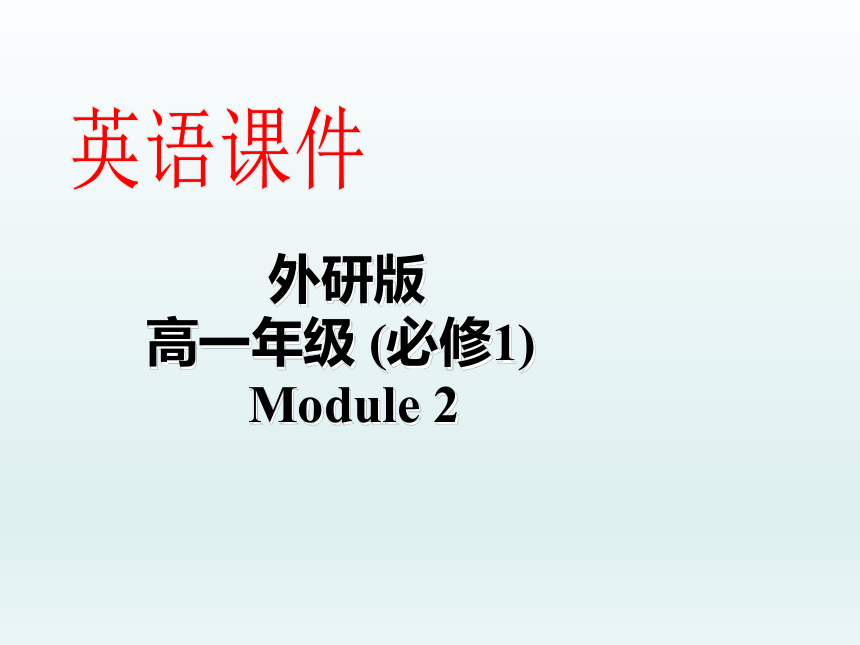
|
|
| 格式 | pptx | ||
| 文件大小 | 185.4KB | ||
| 资源类型 | 教案 | ||
| 版本资源 | 外研版 | ||
| 科目 | 英语 | ||
| 更新时间 | 2023-02-12 00:00:00 | ||
图片预览





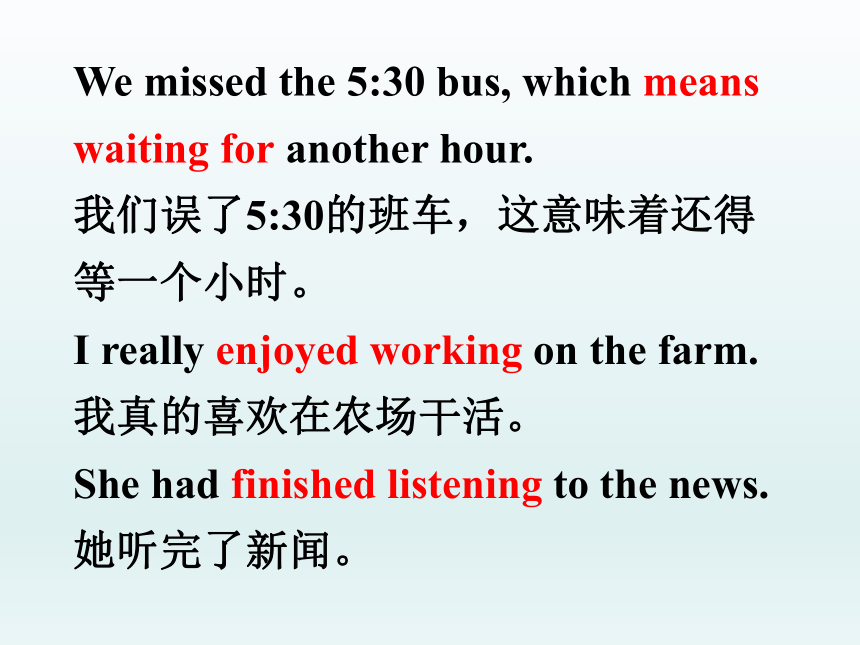

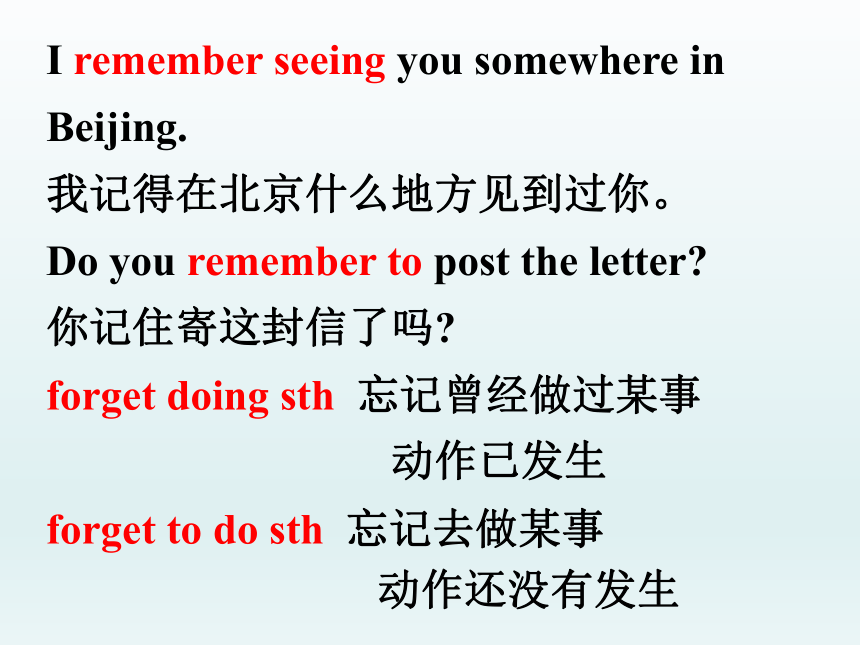
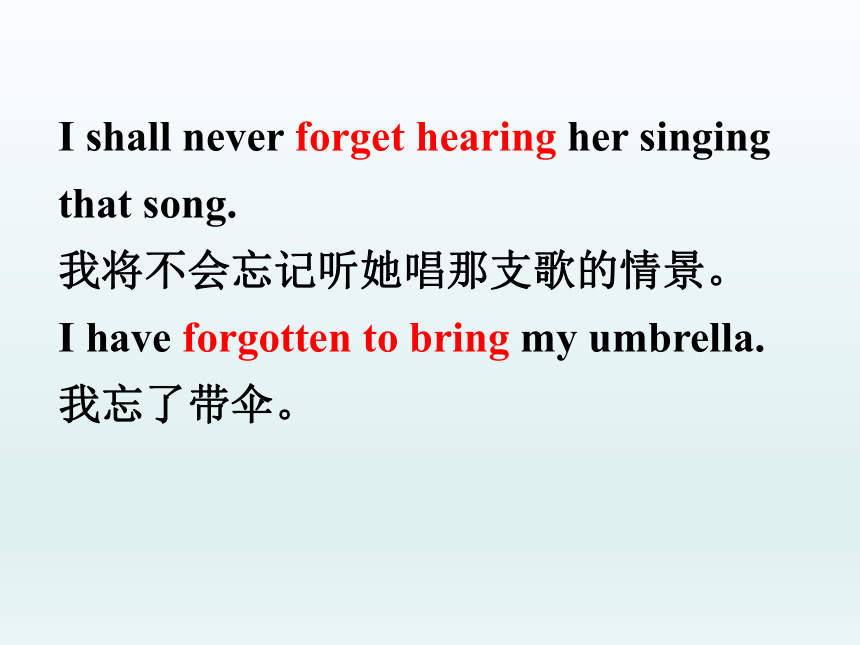
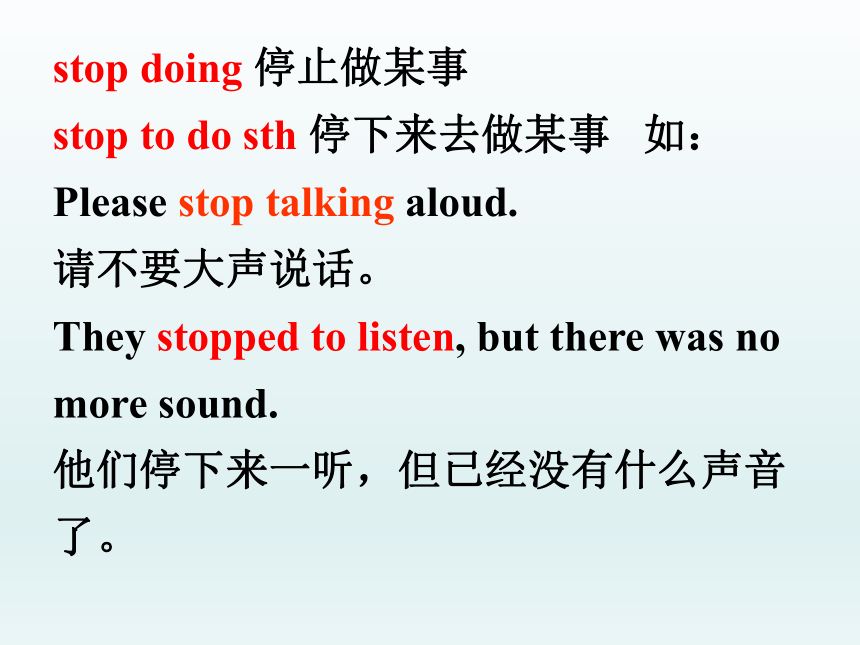

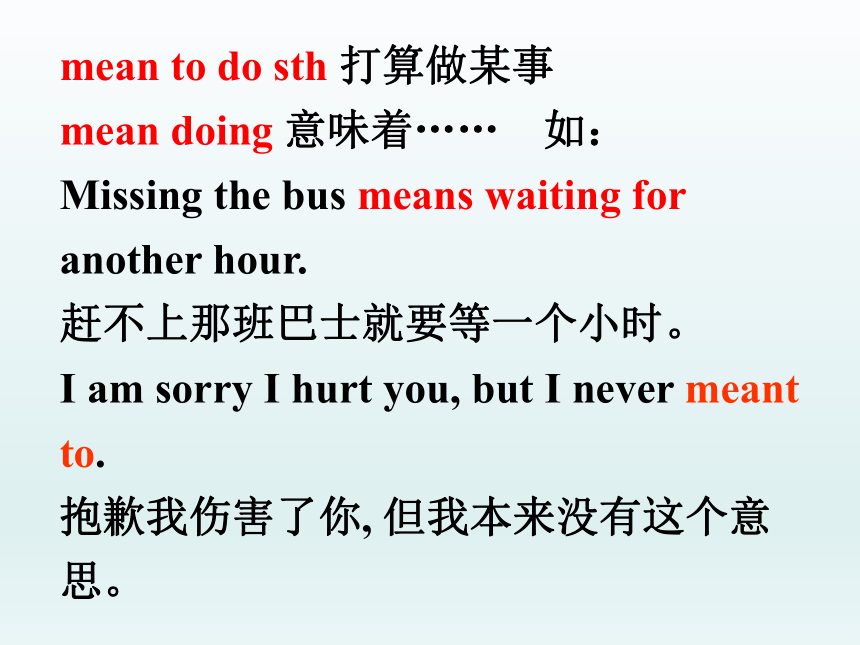
文档简介
(共33张PPT)
外研版
高一年级 (必修1)
Module 2
英语课件
Grammar
1) 常见的直接接动词-ing形式的动词有:
admit, avoid, advise, allow, appreciate, consider (考虑), delay, enjoy, escape, fancy, finish, forbid, imagine, keep, mind, permit, practise, risk, suggest等。
2) 常见的直接接动词-ing形式的短语:
feel like, give up, can’t help, be used to,
keep on, insist on, look forward to, put off, devote…to , stick to, object to, thanks to, be busy in, get down to, have some trouble /difficulty /problems (in)等。如:
I am looking forward to seeing you.
我盼望着再次见到你。
The doctor advised taking more exercise.
医生建议多运动。
The boy refused to admit stealing my money.
这个男孩拒绝承认偷了我的钱。
We missed the 5:30 bus, which means
waiting for another hour.
我们误了5:30的班车,这意味着还得等一个小时。
I really enjoyed working on the farm.
我真的喜欢在农场干活。
She had finished listening to the news.
她听完了新闻。
注: ①有些动词如: remember, forget, stop, try, mean,regret等后既可以跟动词-ing形式,也可跟动词不定式作宾语,但意义不同。如:
remember doing sth 记得曾经做过某事
remember to do sth 记住做某事
动作已发生
动作还没有发生
I remember seeing you somewhere in Beijing.
我记得在北京什么地方见到过你。
Do you remember to post the letter
你记住寄这封信了吗
forget doing sth 忘记曾经做过某事
forget to do sth 忘记去做某事
动作已发生
动作还没有发生
I shall never forget hearing her singing that song.
我将不会忘记听她唱那支歌的情景。
I have forgotten to bring my umbrella.
我忘了带伞。
stop doing 停止做某事 stop to do sth 停下来去做某事 如:
Please stop talking aloud. 请不要大声说话。
They stopped to listen, but there was no more sound. 他们停下来一听,但已经没有什么声音了。
try doing 试着做某事
try to do sth 尽力去做某事
Why not try doing it in some other way
为什么不用其他办法试一试呢?
I tried to solve the problem but I couldn’t.
我试图解答那个数学题,但我解不出。
“做做看”之意
“想要努力去做”之意,但实际上有没有做是另一回事。
mean to do sth 打算做某事
mean doing 意味着…… 如:
Missing the bus means waiting for another hour.
赶不上那班巴士就要等一个小时。
I am sorry I hurt you, but I never meant to.
抱歉我伤害了你, 但我本来没有这个意思。
regret doing 对于……感到遗憾/后悔
regret to do sth 因……感到遗憾
I regret lending him so much money.
He never paid me back.
我很后悔借给他那么多钱。他从来没有还过我。
I regret to tell you that you failed the test.
我遗憾的告诉你你没有通过考试。
② 动词like, love, prefer后接不定式或动词-ing形式作宾语均可。但有一些细微的差别。如表示经常性、习惯性的动作常用动词-ing形式,如表示特定情况或具体动作则常用动词不定式。如:
I like listening to music of this kind.
I like to listen to this song.
They prefer going to the beach in summer.
They prefer to be alone now.
表示一般情况
表示一般情况
表示特定情况
表示特定情况
注意:如果like, love, prefer前有would/should 时,后面则接动词不定式。如:
I’d like to go swimming this weekend.
本周我愿意游泳。
I would love to meet your parents.
我想见你的父母。
③ begin, start, continue后跟不定式和动词-ing形式,通常没有差别。但在下列三种情况下,其后需用动词不定式:
A. 当begin/start用于进行时时;
B. 当begin/start的主语是物时;
C. 当其后的动词为不可以用于进行时的表示心理活动或精神状态的动词时。如:
I am beginning to remember it.
我开始记起这件事了。
The snow began to melt.
雪开始融化。
He began to feel afraid.
他开始觉得害怕。
It started to rain.
雨开始下了。
④ need表示“需要”,require表示 “要求”,want 表示“想要”时后面
接动词-ing形式或 to be done结构。
如:
The house wants/needs/requires repairing.
The house wants/needs/requires to be repaired.
相当于:
⑤ 有时动词-ing形式前面可有自己的逻辑主语。如:
Would you mind my opening the door
我打开门你介意吗?
Would you mind my sitting next to you
你不介意我坐你旁边吧?
1. In some parts of London, missing a bus
means________ for another hour.
A. waiting B. to wait
C. wait D. to be waiting
Exercise
2.The discovery of new evidence (证据) led to _______.
A. the thief having caught
B. catch the thief
C. the thief being caught
D. the thief to be caught
3. One learns a language by making
mistakes and ______ them.
A. correct B. correcting
C. corrects D. to correct
4. She meant _____ but the look on your
face suggested “No”.
A. explaining B. to explain
C. explanation D. to be explained
5. — When did you go to the States
— I remember _____ there when I was
ten.
A. having taken B. to be taken
C. being taken D. to take
6. He is so busy that he can’t help _____
the classroom.
A. cleaning B. to cleaning
C. to clean D. cleaned
7. — I have been knocking at the door,
but no one answers.
— Why not ____ at the back door
A. try knocking B. try to knock
C. to try knocking D. to try to knock
8. As a young man from a rich family, can
you imagine ____ in such a small and
dirty place
A. to work B. yourself to work
C. working D. work
9. My uncle is considering ______ his heath.
A. improve B. to improve
C. improving D. to be improved
10. We should keep ________ English
every day.
A. to practise speaking
B. practise speaking
C. practising speaking
D. practising to speak
11. He got well-prepared for the job
interview, for he couldn’t risk
_______ the good opportunity.
A. to lose B. losing
C. to be lost D. being lost
12. She was so angry that she felt like
______ something at him.
A. to throw B. to have thrown
C. throwing D. having thrown
13. Jean did not have time to go to the
concert last night because she was
busy ______ for her examination.
A. to prepare B. to be prepared
C. preparing D. being prepared
14. The form needs ______ in ink.
A. filling in B. to fill in
C. being filled in D. to be filled
15. Does your shirt require ______, sir
A. being pressed B. to press
C. to be pressed D. to be pressing
16. That you gave him such a book to read
meant _____.
A. to waste his time
B. wasting his time
C. being wasted his time
D. to be wasted his time
17. Mr Smith had meant ______ here
the next day, but he changed his mind.
A. leaving B. being left
C. having left D. to leave
18. Smith enjoys ______ football on
Sunday afternoon, doesn’t he
A. to be playing B. to playing
C. to play D. playing
【即学即练】
用括号内所给动词的适当形式填空。
1. We were lucky to escape ________ (hit) by the car.
2. She always keeps _______ (put) off ______ (see) the dentist.
3. Sorry, we don’t allow ________ (smoke) here.
being hit
putting
smoking
seeing
going
4. All our classmates are considering _____ (go) to the city centre for the fashion show.
5. Can you imagine what difficulty we had ________ (reach) home in the storm
6. It’s time for me to get down to ________ (mark) the papers.
reaching
marking
7. I can’t stand _______________ (work) with Tom in the same office. He talks a lot while working.
8. —Remember ________ (return) the bat to me.
—But I remember ________ (return) it to you.
working / to work
to return
returning
外研版
高一年级 (必修1)
Module 2
英语课件
Grammar
1) 常见的直接接动词-ing形式的动词有:
admit, avoid, advise, allow, appreciate, consider (考虑), delay, enjoy, escape, fancy, finish, forbid, imagine, keep, mind, permit, practise, risk, suggest等。
2) 常见的直接接动词-ing形式的短语:
feel like, give up, can’t help, be used to,
keep on, insist on, look forward to, put off, devote…to , stick to, object to, thanks to, be busy in, get down to, have some trouble /difficulty /problems (in)等。如:
I am looking forward to seeing you.
我盼望着再次见到你。
The doctor advised taking more exercise.
医生建议多运动。
The boy refused to admit stealing my money.
这个男孩拒绝承认偷了我的钱。
We missed the 5:30 bus, which means
waiting for another hour.
我们误了5:30的班车,这意味着还得等一个小时。
I really enjoyed working on the farm.
我真的喜欢在农场干活。
She had finished listening to the news.
她听完了新闻。
注: ①有些动词如: remember, forget, stop, try, mean,regret等后既可以跟动词-ing形式,也可跟动词不定式作宾语,但意义不同。如:
remember doing sth 记得曾经做过某事
remember to do sth 记住做某事
动作已发生
动作还没有发生
I remember seeing you somewhere in Beijing.
我记得在北京什么地方见到过你。
Do you remember to post the letter
你记住寄这封信了吗
forget doing sth 忘记曾经做过某事
forget to do sth 忘记去做某事
动作已发生
动作还没有发生
I shall never forget hearing her singing that song.
我将不会忘记听她唱那支歌的情景。
I have forgotten to bring my umbrella.
我忘了带伞。
stop doing 停止做某事 stop to do sth 停下来去做某事 如:
Please stop talking aloud. 请不要大声说话。
They stopped to listen, but there was no more sound. 他们停下来一听,但已经没有什么声音了。
try doing 试着做某事
try to do sth 尽力去做某事
Why not try doing it in some other way
为什么不用其他办法试一试呢?
I tried to solve the problem but I couldn’t.
我试图解答那个数学题,但我解不出。
“做做看”之意
“想要努力去做”之意,但实际上有没有做是另一回事。
mean to do sth 打算做某事
mean doing 意味着…… 如:
Missing the bus means waiting for another hour.
赶不上那班巴士就要等一个小时。
I am sorry I hurt you, but I never meant to.
抱歉我伤害了你, 但我本来没有这个意思。
regret doing 对于……感到遗憾/后悔
regret to do sth 因……感到遗憾
I regret lending him so much money.
He never paid me back.
我很后悔借给他那么多钱。他从来没有还过我。
I regret to tell you that you failed the test.
我遗憾的告诉你你没有通过考试。
② 动词like, love, prefer后接不定式或动词-ing形式作宾语均可。但有一些细微的差别。如表示经常性、习惯性的动作常用动词-ing形式,如表示特定情况或具体动作则常用动词不定式。如:
I like listening to music of this kind.
I like to listen to this song.
They prefer going to the beach in summer.
They prefer to be alone now.
表示一般情况
表示一般情况
表示特定情况
表示特定情况
注意:如果like, love, prefer前有would/should 时,后面则接动词不定式。如:
I’d like to go swimming this weekend.
本周我愿意游泳。
I would love to meet your parents.
我想见你的父母。
③ begin, start, continue后跟不定式和动词-ing形式,通常没有差别。但在下列三种情况下,其后需用动词不定式:
A. 当begin/start用于进行时时;
B. 当begin/start的主语是物时;
C. 当其后的动词为不可以用于进行时的表示心理活动或精神状态的动词时。如:
I am beginning to remember it.
我开始记起这件事了。
The snow began to melt.
雪开始融化。
He began to feel afraid.
他开始觉得害怕。
It started to rain.
雨开始下了。
④ need表示“需要”,require表示 “要求”,want 表示“想要”时后面
接动词-ing形式或 to be done结构。
如:
The house wants/needs/requires repairing.
The house wants/needs/requires to be repaired.
相当于:
⑤ 有时动词-ing形式前面可有自己的逻辑主语。如:
Would you mind my opening the door
我打开门你介意吗?
Would you mind my sitting next to you
你不介意我坐你旁边吧?
1. In some parts of London, missing a bus
means________ for another hour.
A. waiting B. to wait
C. wait D. to be waiting
Exercise
2.The discovery of new evidence (证据) led to _______.
A. the thief having caught
B. catch the thief
C. the thief being caught
D. the thief to be caught
3. One learns a language by making
mistakes and ______ them.
A. correct B. correcting
C. corrects D. to correct
4. She meant _____ but the look on your
face suggested “No”.
A. explaining B. to explain
C. explanation D. to be explained
5. — When did you go to the States
— I remember _____ there when I was
ten.
A. having taken B. to be taken
C. being taken D. to take
6. He is so busy that he can’t help _____
the classroom.
A. cleaning B. to cleaning
C. to clean D. cleaned
7. — I have been knocking at the door,
but no one answers.
— Why not ____ at the back door
A. try knocking B. try to knock
C. to try knocking D. to try to knock
8. As a young man from a rich family, can
you imagine ____ in such a small and
dirty place
A. to work B. yourself to work
C. working D. work
9. My uncle is considering ______ his heath.
A. improve B. to improve
C. improving D. to be improved
10. We should keep ________ English
every day.
A. to practise speaking
B. practise speaking
C. practising speaking
D. practising to speak
11. He got well-prepared for the job
interview, for he couldn’t risk
_______ the good opportunity.
A. to lose B. losing
C. to be lost D. being lost
12. She was so angry that she felt like
______ something at him.
A. to throw B. to have thrown
C. throwing D. having thrown
13. Jean did not have time to go to the
concert last night because she was
busy ______ for her examination.
A. to prepare B. to be prepared
C. preparing D. being prepared
14. The form needs ______ in ink.
A. filling in B. to fill in
C. being filled in D. to be filled
15. Does your shirt require ______, sir
A. being pressed B. to press
C. to be pressed D. to be pressing
16. That you gave him such a book to read
meant _____.
A. to waste his time
B. wasting his time
C. being wasted his time
D. to be wasted his time
17. Mr Smith had meant ______ here
the next day, but he changed his mind.
A. leaving B. being left
C. having left D. to leave
18. Smith enjoys ______ football on
Sunday afternoon, doesn’t he
A. to be playing B. to playing
C. to play D. playing
【即学即练】
用括号内所给动词的适当形式填空。
1. We were lucky to escape ________ (hit) by the car.
2. She always keeps _______ (put) off ______ (see) the dentist.
3. Sorry, we don’t allow ________ (smoke) here.
being hit
putting
smoking
seeing
going
4. All our classmates are considering _____ (go) to the city centre for the fashion show.
5. Can you imagine what difficulty we had ________ (reach) home in the storm
6. It’s time for me to get down to ________ (mark) the papers.
reaching
marking
7. I can’t stand _______________ (work) with Tom in the same office. He talks a lot while working.
8. —Remember ________ (return) the bat to me.
—But I remember ________ (return) it to you.
working / to work
to return
returning
